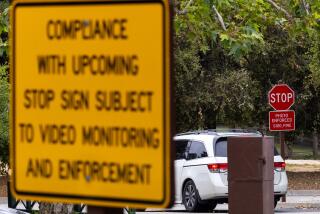Owner has the right to dispute fines
- Share via
Question: Shortly after our governing documents were restated and amended, my association claimed I owed $1,578.36 in unsubstantiated fines and penalties. I asked a board member what the fines were for and he told me that I keep breaking the rules. They’re also billing me $502 in assessments that I don’t owe. They sent a certified letter threatening to sue me for $2,080.36 and place a lien on my unit.
I repeatedly ask management to substantiate the amounts owed but they refuse, saying they have too many clients. Management and the board ignore my letters requesting proof that I owe the amounts claimed. What must I do to prevent the association from suing me or placing a lien on my unit?
Answer: These types of actions are intended to intimidate and frustrate titleholders into paying without first determining that money is owed.
Fines and assessments are different concepts. Read the governing documents and covenants, conditions and restrictions, or CC&Rs;, to determine whether fines may be issued. Because fines are subjectively based on someone’s “word,” unambiguous procedures must be in place before allegations are made that a member violated a specific rule.
For a fine to be levied properly, each time an owner supposedly breaks a rule, two board members must personally witness the breach. The board must issue a notice of its intention to levy a fine and provide the titleholder with notice and an opportunity to be heard regarding the fine levy.
Managers should have no power to levy fines or issue fine notices, and board members cannot delegate their duty to do so. Under Civil Code section 1365.1(b), the association may not use nonjudicial foreclosure to collect fines or penalties and, under Civil Code section 1367.1(a), regular or special assessments are the owner’s debts.
Some associations circumvent these owner protections by making their own laws and do so by amending, rewriting or restating their CC&Rs.; Unbeknown to owners, an amendment is inserted in the new CC&Rs; that converts fines and other association reimbursements to an assessment.
Not fully understanding the legal ramifications of such amendments and thinking such payments are merely reimbursements that an errant owner owes the association, unwary owners vote to accept the new CC&Rs.; This seemingly innocuous insertion for “reimbursement” serves to bypass owner protections in the Davis-Stirling Act and allows the association to place a lien on an owner’s separate interest, then proceed to foreclose to collect.
Check your CC&Rs; for such amendments and if they are there, have an attorney determine the validity of the vote that approved the amendment or begin the process of revoking those changes. Failure to pay association assessments can be the cause of a lien, a lawsuit and foreclosure.
Civil Code section 1367(a) provides that a regular or special assessment, late charges, reasonable costs of collection and interest shall be a debt of the titleholder of the separate interest at the time the assessment or other sums are levied.
Civil Code section 1351(k)(2) sets forth the association’s power to enforce that owner’s obligation with respect to enjoyment of the common area by means of an assessment that may become a lien on their separate interest. The steps an association must take before placing a lien on titleholder property are found in Civil Code section 1351.
Owners have the right to protest disputed assessments by written notice that the amount is paid under protest. For an effective protest, the titleholder must follow the steps in Civil Code section 1366.3. In part, the protest must be in writing and received by the board before the association files a notice of delinquent assessment.
The titleholder must pay the full amount under protest to prevent an association from either starting, or if started, continuing the process of foreclosure.
On the payment instrument and accompanying letter write the words “paid under protest, apply to disputed assessment.” The titleholder must continue to pay monthly assessments, even during a protest period.
Under Civil Code section 1365.2, a titleholder may review the association’s books and records on demand, and the association must comply, although legal action might be necessary to enforce that right.
Please send questions to P.O. Box 11843, Marina del Rey, CA 90295 or e-mail [email protected].
More to Read
Inside the business of entertainment
The Wide Shot brings you news, analysis and insights on everything from streaming wars to production — and what it all means for the future.
You may occasionally receive promotional content from the Los Angeles Times.










